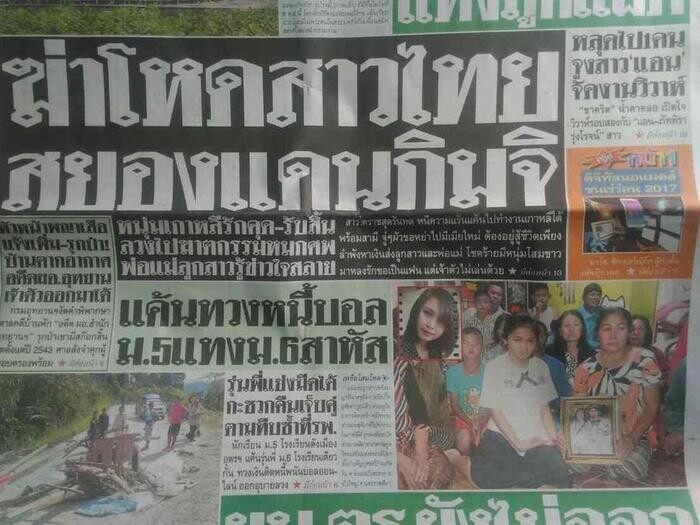hankyoreh
Links to other country sites 다른 나라 사이트 링크
[Editorial] Migrant worker’s death shows necessity of reforming employment permit system

Chumita, a female worker who arrived in from Thailand eleven years ago, was recently found dead in South Korea, where she had spent a third of her life. A male coworker confessed to killing her during a failed sexual assault attempt, which he lured her into with the threat of an imminent crackdown on illegal workers. She was 29 at the time.
Chumita was a dedicated worker who sent home most of the earnings she made at her factory in Gyeonggi Province, where she had been employed for nearly ten years. As an undocumented migrant worker, her position was always precarious. A “crackdown” for her meant deportation; questioning what her colleague told her would have been a luxury she couldn’t afford. As South Koreans, we feel both tremendous anger at this barbaric exploitation of her situation and a sense of boundless shame. It’s a crime that must be sternly punished.
It’s not all that out of the ordinary for undocumented migrant workers to be gravely injured or even killed in accidents while fleeing from Office of Immigration authorities. A few such cases have happened every year since the employment permit system was implemented in 2003 – and those are just the ones we know about. Since the government doesn’t keep official statistics, we can only assume the actual number of victims is much larger. It’s also unclear how many undocumented migrant workers are forced to flee their workplaces and become illegal residents because of toxic employment permit system provisions barring them from changing jobs.
Since 2013, the police have ostensibly been freed from their previous obligation to provide information about any illegal residents reporting crimes against them and then turning them over to immigration. In reality, the system does not work that way. Active information sharing and guidance are needed on this. As South Korea enters a new era with some one million migrant workers, a better approach would be to go a step farther and grant a grace period to illegal residents who are caught, allowing them the chance to leave independently rather than deporting them.
We should also listen to the groups that are suggesting the approach of re-registering illegal residents under lawful sojourn status if they meet certain conditions. No one should have his or her human rights disregarded simply for being an illegal resident.
Please direct questions or comments to [english@hani.co.kr]

Editorial・opinion
![[Editorial] Perilous stakes of Trump’s rhetoric around US troop pullout from Korea [Editorial] Perilous stakes of Trump’s rhetoric around US troop pullout from Korea](https://flexible.img.hani.co.kr/flexible/normal/500/300/imgdb/original/2024/0509/221715238827911.jpg) [Editorial] Perilous stakes of Trump’s rhetoric around US troop pullout from Korea
[Editorial] Perilous stakes of Trump’s rhetoric around US troop pullout from Korea![[Guest essay] Preventing Korean Peninsula from becoming front line of new cold war [Guest essay] Preventing Korean Peninsula from becoming front line of new cold war](https://flexible.img.hani.co.kr/flexible/normal/500/300/imgdb/original/2024/0507/7217150679227807.jpg) [Guest essay] Preventing Korean Peninsula from becoming front line of new cold war
[Guest essay] Preventing Korean Peninsula from becoming front line of new cold war- [Column] The state is back — but is it in business?
- [Column] Life on our Trisolaris
- [Editorial] Penalties for airing allegations against Korea’s first lady endanger free press
- [Editorial] Yoon must halt procurement of SM-3 interceptor missiles
- [Guest essay] Maybe Korea’s rapid population decline is an opportunity, not a crisis
- [Column] Can Yoon steer diplomacy with Russia, China back on track?
- [Column] Season 2 of special prosecutor probe may be coming to Korea soon
- [Column] Park Geun-hye déjà vu in Yoon Suk-yeol
Most viewed articles
- 1Nuclear South Korea? The hidden implication of hints at US troop withdrawal
- 2[Editorial] Perilous stakes of Trump’s rhetoric around US troop pullout from Korea
- 3‘Free Palestine!’: Anti-war protest wave comes to Korean campuses
- 4Korea likely to shave off 1 trillion won from Indonesia’s KF-21 contribution price tag
- 5In Yoon’s Korea, a government ‘of, by and for prosecutors,’ says civic group
- 6With Naver’s inside director at Line gone, buyout negotiations appear to be well underway
- 7[Photo] ‘End the genocide in Gaza’: Students in Korea join global anti-war protest wave
- 8Seoul getting its first-ever vertical farm
- 9‘We must say no’: Seoul defense chief on Korean, USFK involvement in hypothetical Taiwan crisis
- 10Behind-the-times gender change regulations leave trans Koreans in the lurch